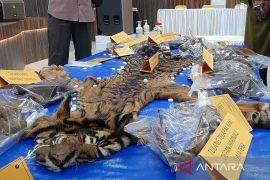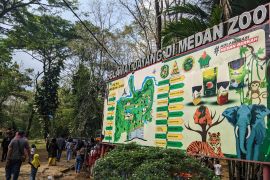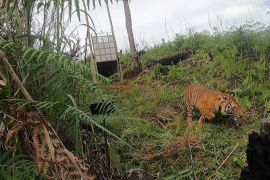This commitment needs to materialize into concrete action so that destruction of this kind is immediately halted, "Jakarta (ANTARA News) - On the eighth day of the Greenpeace "Tiger Eyes" tour, five Greenpeace activists arrived in the area around the village of Kusuma, District Pangkalan Kuras, Pelalawan regency of Riau Province, to see the condition of the forest which has become one of the Sumatran Tigers last remaining habitats.
"In this area, Greenpeace activists were bearing witness to the forests around Tesso Nilo being converted to acacia plantation by PT. Arara Abadi (a subsidiary of Asia Pulp and Paper-APP)," Greenpeace Southeast Asia said in a press statement here on Friday.
In July, several Greenpeace activists accompanied the Center for Conservation of Natural Resources (BKSDA) Riau to this area in order to rescue a trapped Sumatran Tiger. Unfortunately the rescue effort failed to save the tiger`s life as it had been trapped for seven days and was too weak to survive the rescue attempt.
Greenpeace activists were shocked because in this area, the carbon-rich peatlands, more than three meters deep were destroyed. In addition to documenting these conditions, the activists unfurled banners reading "Save the Forests, Save the Tiger Home" encouraging all Indonesian people to participate in efforts to save Indonesia`s remaining forests.
"Today we are in one of the last remaining forests which is the home of the endangered Sumatran tiger. We saw that destruction is still freely occurring, even on carbon-rich peat lands. Yesterday President Susilo Bambang Yudhoyono expressed his commitment to save Indonesia`s remaining forests. This commitment needs to materialize into concrete action so that destruction of this kind is immediately halted, " said Rusmadya Maharuddin, Greenpeace Southeast Asia forest campaigner said last Wednesday (Sept 28).
"We must fight to save Indonesia`s remaining forests. We`re presenting evidence of this destruction, and inviting all Indonesians to join us and be the `eyes of a tiger`. The companies responsible must stop their destructive practices and shift to more responsible operations, while the Government must review all existing concessions and protect peatland immediately," Rusmadya added.
The Sumatran tiger`s forest habitat is being destroyed, with only around 400 left in the wild. The Indonesian government estimates that more than one million hectares of forest are being cleared every year. With the current rates of forest destruction, this magnificent animal that has inspired Indonesia`s rich culture, is likely to follow its predecessors, the Javanese and Bali tiger, into extinction. (*)
Editor: Aditia Maruli Radja
Copyright © ANTARA 2011











